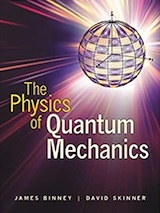
|
FreeComputerBooks.com
Links to Free Computer, Mathematics, Technical Books all over the World
|
|
- Title: The Physics of Quantum Mechanics
- Author(s) James Binney, David Skinner
- Publisher: Oxford University Press (December 31, 2013); eBook (Final Draft)
- Paperback: 412 pages
- eBook: PDF
- Language: English
- ISBN-10: 0199688575
- ISBN-13: 978-0199688579
- Share This:

|
This book aims to give students a good understanding of how Quantum Mechanics describes the material world. It shows that the theory follows naturally from the use of probability amplitudes to derive probabilities. It stresses that stationary states are unphysical mathematical abstractions that enable us to solve the theory's governing equation, the time-dependent Schroedinger equation.
Every opportunity is taken to illustrate the emergence of the familiar classical, dynamical world through the quantum interference of stationary states. The text stresses the continuity between the quantum world and the classical world, which is merely an approximation to the quantum world.
About the Authors- James Binney, Head of the Rudolf Peierls Centre for Theoretical Physics, University of Oxford,David Skinner, Lecturer in Mathematics, University of Cambridge.
- Quantum Physics, Quantum Mechanics, Quantum Computing
- Physics
- Applied Mathematics
- General and Popular Science

- The Physics of Quantum Mechanics (James Binney, et al.)
- The Mirror Site (1) - PDF
- The Mirror Site (2) - PDF
-
 Relativistic Quantum Mechanics: Relativistic Quantum Fields
Relativistic Quantum Mechanics: Relativistic Quantum Fields
This book provides a classroom-tested introduction to the formal and conceptual foundations of quantum field theory. Only requires previous courses in Classical Mechanics, relativity, and Quantum Mechanics.
-
 A Primer on Quantum Fluids (Carlo F. Barenghi, et al.)
A Primer on Quantum Fluids (Carlo F. Barenghi, et al.)
The aim of this primer is to cover the essential theoretical information, quickly and concisely, in order to enable readers to tackle projects in topical areas of Quantum Fluids, for example, solitons, vortices and collective modes.
-
 Foundations of Quantum Theory: Operator Algebras
Foundations of Quantum Theory: Operator Algebras
This book studies the foundations of quantum theory through its relationship to classical physics, includes comprehensive appendices on functional analysis and C*-algebras, as well as a briefer one on logic, category theory, and topos theory.
-
 Quantum Mechanics Made Simple (Weng Cho Chew)
Quantum Mechanics Made Simple (Weng Cho Chew)
The book at hand is meant to help you precisely with that: Understanding the basics of Quantum Mechanics, so that you can start asking the big questions and, with the help of modern physicists, find the answers to these questions as well.
-
 The Cellular Automaton Interpretation of Quantum Mechanics
The Cellular Automaton Interpretation of Quantum Mechanics
This book presents the deterministic view of quantum mechanics developed by Nobel Laureate Gerard 't Hooft. The author gives examples of models that are classical in essence, but can be analysed by the use of quantum techniques.
-
 Mathematical Methods in Quantum Mechanics (Gerald Teschl)
Mathematical Methods in Quantum Mechanics (Gerald Teschl)
This book is a brief, but self-contained, introduction to the mathematical methods of quantum mechanics, with a view towards applications to Schrodinger operators. Very clear and detailed way and supplements it by numerous exercises.
-
 Mathematical Foundations of Quantum Theory
Mathematical Foundations of Quantum Theory
This is a collection of lecture notes, all shared a common interest in answering quantum issues. The goal is to give a mathematically clear and self-containing explanation of the main concepts of the modern language of quantum theory.
-
 Introduction to Classical and Quantum Computing (Tom Wong)
Introduction to Classical and Quantum Computing (Tom Wong)
This book is for students who want to learn quantum computing beyond a conceptual level, but who lack advanced training in mathematics. The only prerequisite is trigonometry, and mathematics beyond that will be covered.
-
 Learn Quantum Computation using Qiskit
Learn Quantum Computation using Qiskit
This is a free digital textbook that will teach you the concepts of quantum computing while you learn to use the Qiskit SDK. It is built on a jupyter notebook framework that allows for easy reading, but it also allows readers to edit and run the code right in the textbook.
-
 Quantum Computing for the Quantum Curious
Quantum Computing for the Quantum Curious
This open access book makes quantum computing more accessible than ever before. It bridges the gap between popular science articles and advanced textbooks by making key ideas accessible with just high school physics as a prerequisite.
-
 Quantum Computing: Progress and Prospects
Quantum Computing: Progress and Prospects
Provides an introduction to the Quantum Computing, including the unique characteristics and constraints of the technology, and assesses the feasibility and implications of creating a functional quantum computer capable of addressing real-world problems.
-
 Quantum Computing Since Democritus (Scott Aaronson)
Quantum Computing Since Democritus (Scott Aaronson)
This book takes readers on a tour through some of the deepest ideas of maths, computer science and physics. Full of insights, arguments and philosophical perspectives, the book covers an amazing array of topics.
-
 The Functional Analysis of Quantum Information Theory
The Functional Analysis of Quantum Information Theory
This book provides readers with a concise introduction to current studies on operator-algebras and their generalizations, operator spaces and operator systems, with a special focus on their application in Quantum Information Science.






